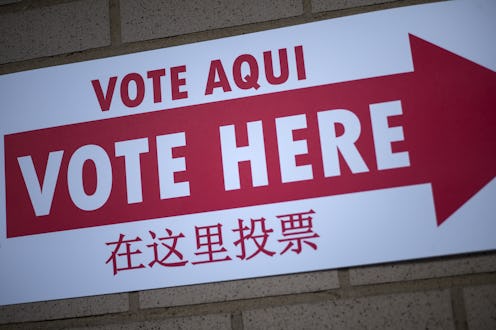News
Here's How Washington D.C. Allocates Delegates
The primary season is over — except that it isn't, technically, at least for the Democrats. Even though Hillary Clinton already has the necessary delegates as well as the endorsements of President Obama, Vice President Biden, and Senator Warren, the end doesn't come until Tuesday. That's the final race, in Washington D.C. Sanders has committed himself to a strong finish, or at least a finish while he refrains from throwing his support behind Clinton. So given all that, you still have some delegate math to do. Which in turn begs the question, is Washington D.C.'s Democratic primary winner take all?
No, it is not. All Democratic races allocate their delegates proportionally. But, there is something interesting to consider when you look at Washington, D.C. The delegates are allocated in a manner unlike almost anywhere else in the country. Many states break up the total number of pledged delegates by congressional district, but not in D.C. The District has no congressional district — not even one — as it is not a state and has no voting representation in Congress. Therefore 13 of D.C.'s 20 pledged delegates are split between the city's two municipal districts, which are each made up of four wards. Another seven are allocated to the district-wide winner.
Thursday night, Sanders held a rally in D.C. in a lead up to the vote. He sent out the invitation immediately after Clinton finished her victory speech Tuesday night; she won four out of the six primaries last week. At the rally his supporters shouted to him, asking that he stay in the race. His words kept hope of a revolution alive:
Next Tuesday in a few days, here in Washington, you will be having the very last primary of the Democratic nominating process. It will be extraordinary if the people of Washington, our nation’s capital, stood up and told the world that they are ready to lead this country into a political revolution.
The D.C. contingent of Sanders supporters will not be able to win him the majority of the delegates from the district. The nation's capital city actually has more superdelegates than pledged delegates. There are 26 unpledged Democratic party leaders and elected officials. Of those, 22 have pledged their support for Clinton and just two for Sanders.
Clinton meanwhile has largely shifted to the general election, albeit from D.C. She gave a speech Friday at the Planned Parenthood Action Fund, denouncing Donald Trump and his attacks on abortion rights, equal pay, and paid family leave. She did not mention Sanders once.
One of her next campaign stops will bring her to Wisconsin, where Obama plans to join her in Green Bay. The swing state is seen as increasingly important, not just for the presidential race but for an open seat in Congress. There's also the potential to beat the Republican incumbent senator.
However the delegate count ends up being divvied up, the key will remain uniting the party against Trump — perhaps with the voting finally over, Sanders will be willing to throw his weight officially behind Clinton.
